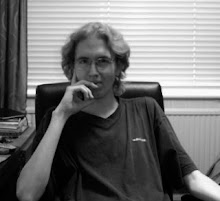Do we assume different identities or modes of thought when talking to others? Such as changing the pattern of speech to enable others to understand an unfamiliar concept. Almost every conversation I have when talking to others about computers I tend to use a less technical terms. This can also be carried over into behaviour sets as well.
For example, I have many different names that my friends and relatives know me by. There's Simon the ordinary typical part-time worker and student, best known to family members; mild-mannered and unassuming for the most part. Then you have dok. Computer programmer and white-hat hacker with a particular skill in fixing computers. Likes rock music and watching anime. Finally you have Alex, the writer and dreamer.
Depending on the given situation, you may encounter all three or more likely the public persona (Simon). It can be quite surprising when friends meet the character of dok when they are more accustomed to Simon. The last persona, that of Alex (i.e. me, right now), serves as an outlet for creative thought and explorer of more ephemeral concepts.
Reading "A Scanner, Darkly" by Phillip K Dick has proved a useful insight into the concept of separate identities in a person. The lead character of Bob Arctor is an undercover narcotics agent who has to investigate himself as part of the operation. He begins to question his actions as Arctor and those by Fred, his agent persona. I recommend it as worth reading along with "Do androids dream of electric sheep" by the same author. Given the ever-increasing stress of real life, is it any wonder that people develop more than one complete personality to cope? Just how much of a jump is it from having multiple persona's to multiple personality disorder? Only time will tell.
So, how many people are you today?
until next time,
Alex.
For example, I have many different names that my friends and relatives know me by. There's Simon the ordinary typical part-time worker and student, best known to family members; mild-mannered and unassuming for the most part. Then you have dok. Computer programmer and white-hat hacker with a particular skill in fixing computers. Likes rock music and watching anime. Finally you have Alex, the writer and dreamer.
Depending on the given situation, you may encounter all three or more likely the public persona (Simon). It can be quite surprising when friends meet the character of dok when they are more accustomed to Simon. The last persona, that of Alex (i.e. me, right now), serves as an outlet for creative thought and explorer of more ephemeral concepts.
Reading "A Scanner, Darkly" by Phillip K Dick has proved a useful insight into the concept of separate identities in a person. The lead character of Bob Arctor is an undercover narcotics agent who has to investigate himself as part of the operation. He begins to question his actions as Arctor and those by Fred, his agent persona. I recommend it as worth reading along with "Do androids dream of electric sheep" by the same author. Given the ever-increasing stress of real life, is it any wonder that people develop more than one complete personality to cope? Just how much of a jump is it from having multiple persona's to multiple personality disorder? Only time will tell.
So, how many people are you today?
until next time,
Alex.
